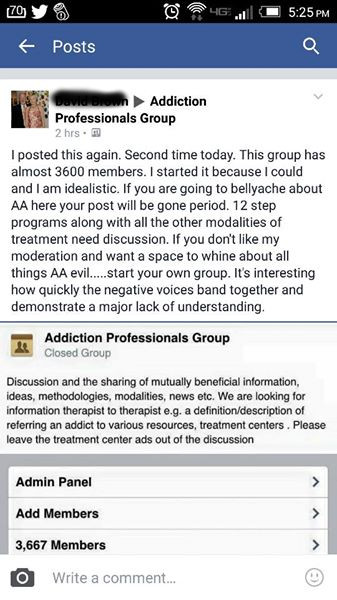Here is an example of an “Addiction Professionals” group on FaceBook. It seems anything but professional if criticism of AA would be censored. This kind of bullying is sadly typical, very similar to how my complaints were treated at Samaritan Counseling Center: just “gone, period”.
Daily Archives: June 3, 2016
OASAS Funds 12-step Promotional Organization?
Why is a 12-step promotional organization being funded by the government?
“In 1972, the Board of Trustees of Gamblers Anonymous in the New York City area requested their Spiritual Advisor, Monsignor Dunne, establish a Council on Compulsive Gambling to do what they could not do because of anonymity- call national attention to the increasing problem of compulsive gambling in the United States.
“Today, NYCPG is funded by the New York State Office of Alcoholism and Substance Abuse Services”
Here are documents explaining why this is very likely illegal: http://ojp.gov/about/ocr/pdfs/TwelveStepRecoveryPrograms_FAQs.pdf and https://www.oasas.ny.gov/mis/bulletins/lsb2002-05.cfm
Social Work Licensing in New York
If you read this article and listen to this interview carefully, you will see that it is the ‘Addiction Treatment Specialists’ who are largely fighting against licensing. Of course they would. Because they will not be able to resolve the contradictions between how they operate now and how they would have to operate with ethical standards in place.
“I wouldn’t go so far as to call them quacks…but…There are any number of providers who may have as little as a high school education… ”
“Department of Corrections and Community Supervision, for instance, said that nearly 300 positions in its Alcohol and Substance Abuse Treatment Services program would need to be licensed to meet the requirement.” OASAS is also exempt.
I commented on the article:
The article mentioned OASAS as being exempt and the Department of Corrections Drug and Alcohol agency being two of the resistant parties. So I wonder if that has to do with:
1. Thinking 12-step membership qualifies you to be a counselor and you don’t need to follow rules.
2. Knowing that working ‘by the rules’ would conflict with a lot of how drug and alcohol treatment is currently done.
I’m all for Ron Bunce and Karin Carreau (who’s blocked me on Twitter, as if anybody even cares that I have an informed opinion)’s push for licensing, because that could certainly improve those sectors of social work that have been most controversial and horrifyingly unaccountable. But I do have another concern.
On my website notpowerless.com I document my attempts to complain to the licensing board (NYS Department of Education, as well as the Department of Health and Human Services) who both responded that there was nothing wrong with some very blatant and unrepentant NASW ethics violations involving 12-step coercion. My question would be: What is licensing really going to accomplish if the licensing board does not acknowledge NASW ethics violations?
Also, violations are even written into DoE law (as here: 12-Step Extortion with NYS License as Leverage Much like Ron Bunce said in his example that an untrained person could provide psychotherapy to HIM, but not vice versa, here a committee with ‘expertise in problems of drug and alcohol abuse’ can hold someone’s license hostage and force them to complete ‘the program’ or kick them out of their job. That’s scary stuff that will need to be addressed.)
There is a follow-up with the 12-steppers’ side of the argument. He basically takes takes the attitude of denying there is a problem with the status quo, saying “we have a solution that doesn’t have a problem”.
What does she mean when she says 2002 was the first time we tried to regulate the spoken word as treatment? Could it be referring to THIS (Local Services Bulletin No. 2002-05: Impact of Recent Federal Court Decision Concerning Alcoholics Anonymous
On Government Funded Providers)? Update:2020 Now this page does not mention that this was from 2002.
Clergy Sexual Misconduct and 12-step Treatment
If the Spotlight 2015 movie made anything clear, it is that sexual misconduct by clergy is a very real and systemic problem. Part of the problem is the power and secrecy that these priests hold over others, but another part of the problem is the same religious treatment system that constantly fails for drug treatment. Both of these facts being clear, it is amazing that pastoral trainers like Clergy and Congregation Consulting of Samaritan Counseling would 1) advocate more secrecy and diversion when sexual misconduct occurs, and 2). advocate 12-step treatment for sexual misconduct.
“Priest [12-step] treatment unfolds in costly, secretive world”
“Such treatment is typically paid for by the diocese, and has cost the church at least $50 million over the last 25 years [as of 2002], estimated A. W. Richard Sipe, a psychologist and ex-priest who treated clergy for 40 years.”

